If IOC is not allowed to run its own affairs, then we can see it close down in the next 10 to 15 years, warns Sudhir Bisht.
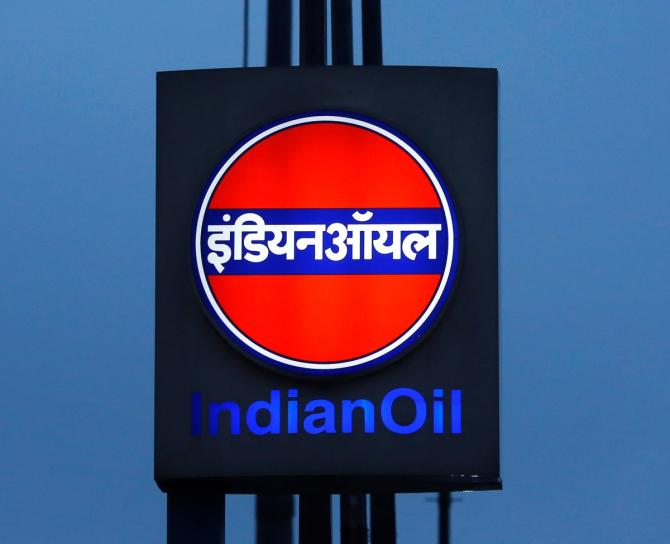
Indian Oil Corporation Limited is a 'Navratna' company, a shining jewel in the crown of India that is Bharat.
IOC has an annual turnover of Rs 514,890 crores and its book value is Rs 120 per share.
Its dividend yield is 11.30%, which is simply fantastic as the bank fixed deposit rates are not even up to 6% nowadays. Yet IOC's share price is only Rs 106 per share.
In contrast Reliance Industries Limited has an annual turnover of Rs 539,238 crores and its book value is Rs 496 per share.
Its dividend yield is negligible (0.02%) when compared to IOC's dividend yield at present prices and yet RIL's share price is around Rs 2,150 per share.
One doesn't have to dive deep to know why the market price of RIL is nearly 20 times higher than IOC's share price.
The book value of RIL and IOC share is the same, Rs 10 per share.
RIL, since it came into existence in the 1970s, has many business portfolios whereas IOC is struck at refining, transportation and distribution of fuels in India.
When the energy companies across the world are foraying into alternative sources of energy, IOC is still taking pride in blending petrol with ethanol.
I am aware of the IOC chairman's recent pronouncement wherein he says that IOC is investing in wind-based power plants and is committed to Compressed Natural Gas and Compressed Biogas, but the fact is that IOC is doing all this under the SATAT scheme.
The IOC chairman also says that he is introducing 15 hydrogen buses in the NCR region. 15 hydrogen buses are like saying that I am checking them out.
Till now IOC's alternative fuel plan is still in a nascent stage. For the number one energy company, the blueprint should have been firmed up by now.
I mean for how many years will IOC continue to draw mileage from ethanol blending, a project that is more than 20 years old!
Where is IOC's strategy for battery or hydrogen power? Its private sector competitor, RIL, has several business revenue streams now, all built on the huge reservoir of cash generated by the petroleum business.
What did IOC do with that cash? Built new refineries that are not world-class in size or efficiency and paid dividends to the government. That is about it!
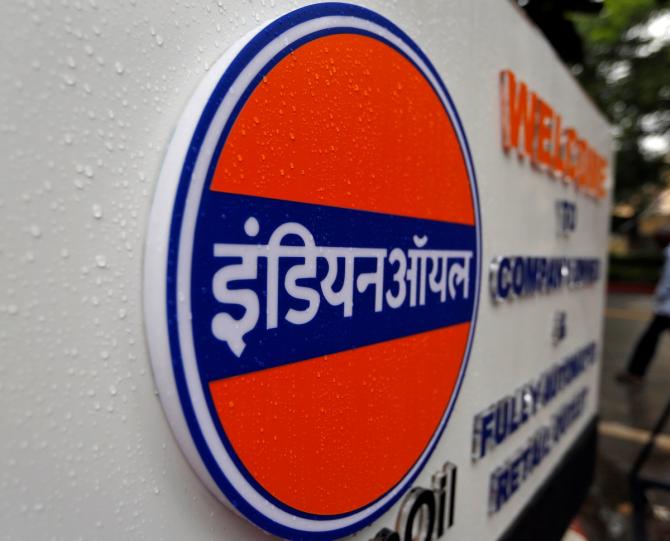
IOC has managed to occupy the leadership position of having the highest number of retail outlets.
This is largely due to the patronage it received from the ministry of petroleum and the fact that new entrants like RIL and Essar (now Nayara Energy) have found it impossible to get land in the city markets.
The cost of setting up a retail outlet had gone up multiple times when private players were allowed to do so.
I think the first private sector outlet, not counting Shell outlets that came under Bharat Petroleum-Bharat Shell JV, came about in India in 2003.
IOC had a 40-year lead over the private sector in the downstream business.
IOC was born in 1959 and since then it has remained a downstream company.
It has added petrochemical to its portfolio but it is not number one even in this business.
The fact is that IOC does not believe that it is in the business of energy or physical mobility.
It believes that it is a petroleum products company. This is a classic case of marketing myopia
It has no big plans for alternative energy like BP or Reliance has.
RIL came into being in 1973. From polyester, it diversified into refining and sale of petrochemical and petroleum products.
It is now into retail (not merely petrol pumps), telecommunications, broadband, OTT, Jio Money, E-commerce and what not.
RIL's two Jamnagar refineries have a combined refining capacity of 68.2 million metric tonnes per annum (MMTPA) which is almost equal to the 69.2 MMTPA refining capacity of IOC's nine refineries (not including the CPCL Chennai refinery).
In addition, the two RIL refineries are far, far more efficient than the nine refineries of IOC.
The Complexity Index of RIL refineries is 21.1%. The index is a measure of the capability of a refinery to upgrade the lowest quality crude oil to the highest quality refinery products, including fuels and petrochemicals. In contrast, the index of IOC's latest refinery, the Paradip refinery, is 12.1%
RIL's market cap at Rs 14 lakh crore is huge when compared to IOC's under Rs 1 lakh crore market cap.
In 2019, RIL toppled IOC to become the biggest company by revenue in India.
With almost the same revenue, the market capitalisation difference in the two companies is stark and unambiguous.
It is clear that the market has faith in RIL's business model that places emphasis on the adoption of the latest technology, spreading of risks across sectors and having a long-term perspective of business. RIL's vision is dictated by ownership that is focussed, zealous and sagacious.
IOC's vision starts from the desks of joint secretary-level officers and is pushed on to the IOC board for implementation.
The market senses the difference between the two approaches and rewards one over the other.
There are no bulls and bears here. The market knows on which horse to bet its money and this is also visible on the ground.
Let us take the case of the retail business of petroleum products.
RIL petrol pumps outsell IOC pumps by a ratio of at least 2:1 in their trading areas.
In fact, IOC lags behind Bharat Petroleum in sales per retail outlet as the Mumbai-based BPCL has maintained some of its professional edge over the past several decades.
BPCL till some time back used to be ranked among the Best Companies to work for. IOC has no such achievements to boast.
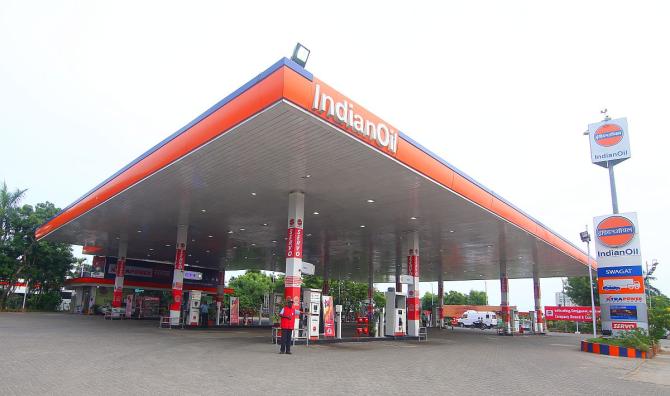
IOC has not done even a single diversification since it took birth under the Fabian Socialistic regime. It doesn't have a substantive presence in the upstream segment.
The IOC chairman said last year that the corporation would enhance its petrochemical capacity by 70% from its current 3.2 million tonnes per year.
Compare this with RIL that is the market leader in the petrochemical business in India and is in fact among the top 10 petrochemical companies in the world. Its refinery has great flexibility in switching between fuel production and petrochemical production.
Even during the complete lockdown in 2020, the RIL refinery operated with more than 90% capacity when IOC operated under 60% capacity.
IOC owns 32,303 out of 77,709 petrol pumps/retail outlets in the country.
At face value, this is a huge resource, but if the transportation sector moves away from petrol and diesel, as the recent studies indicate, these could become fallow plots of land.
If the resolution of the vehicle manufacturers is any indication, the petrol pumps could be locked down by 2030.
The United Kingdom will ban new petrol and diesel cars by 2030. Jaguar, the premium car manufacturer, says it will sell only electric cars from 2025.
Volvo maintains that from 2030, it will no longer sell cars that run on traditional fuel.
Even non-premium vehicle makers like General Motors say it will manufacture only electric vehicles, in Europe at least.
Ford and Volkswagen also pledge to sell more than 70% of cars in Europe that will be electric.
As per a report published on the BBC Web site, the investment bank, UBS, predicts that by 2040, virtually every car that will be sold in the world will be electric.
Bankers are always conservative in their pronouncements and I am sure that by 2030, there would be a huge shift from fossil fuel to some other source of energy.
It could be electric, it could be hydrogen or it could be a hybrid model.
The fact is that the sale of petroleum products would decline rapidly after the tipping point in alternative energy in the transportation sector is achieved.
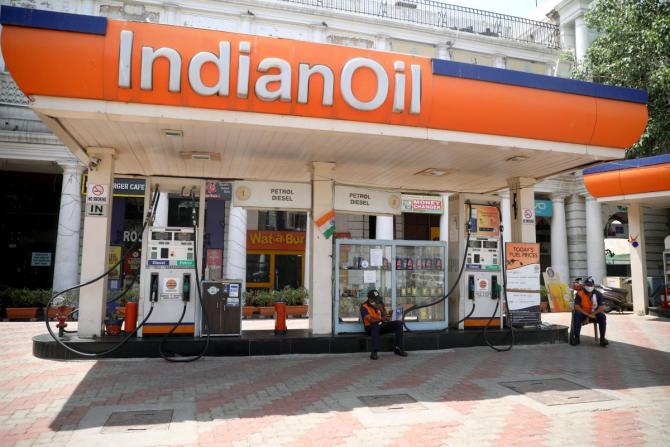
In addition, the cars would become more and more efficient and so would be commercial vehicles.
In India, with advancements in railway infrastructure and with bigger, better, faster and more economical road routes, diesel consumption could decline.
The off-road equipment may continue to depend upon diesel, but on-road consumption could reduce.
Where would that leave IOC, BPC, HPC, RIL and Nayara retail outlets? BPC has 18,766 outlets while HPC has about the similar number of outlets.
RIL has just about 1,400 outlets and Nayara has about 6,000. Shell has surprisingly just about 270 outlets.
So, with the shift from fossil fuel and with not so efficient refineries and with low yielding petrol stations, it is no surprise that IOC market capitalisation, the true indicator of a company's current well-being and future promise, is less than Rs 1 lakh crore and RIL's market capitalisation is a staggering Rs 14.6 lakh crore.
RIL has a verified business sustainability model (not talking of environmental sustainability here) whereas IOC's future, 10 years from now, is hazy.
This now brings us to the question of how to save Indian Oil from the danger of obliteration. I have the following views.
Indian Oil Corporation has a great team of top executives and managers. The IOC hiring process is such that only engineers and MBAs with a first class degree are able to compete in an examination for selection to IOC's officer cadre.
Some great men like Subir Raha (who took ONGC to glory) and Pawan Kapil (who is the key person behind the RIL refinery division) are all IOCians.
Therefore, IOC has no dearth of leaders at the top, middle and junior management cadres.
The solution lies in empowering the IOC management and freeing them up from tiptoeing to Shastri Bhavan to pay respect to the bureaucrats sitting there.
Let IOC be a board-driven company, just like Titan or HCL or WIPRO or L&T is.
Let the board decide who would be the IOC CEO and let the CEO have a run of more than five years, at the very least.
Yogi Deveshwar, who was at the helm of ITC for more than two decades, transformed ITC. He was altered ITC from being just a tobacco company to a company that is well diversified today.
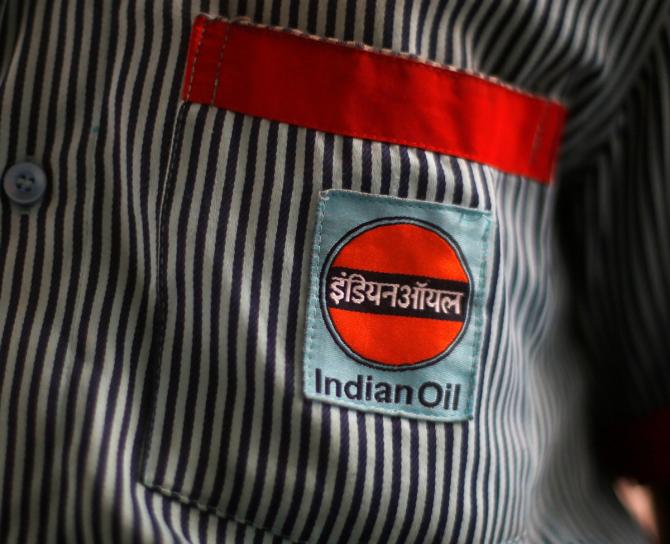
Mukesh Ambani has been at the helm of RIL for more than 20 years.
IOC also needs a visionary leader who will transform IOC into the Top Three companies in India in market capitalisation.
IOC's strategic business units need re-examination, review and perhaps restructuring.
One of its divisions, the R&D division, needs critical examination. What breakthrough technology has been developed by IOC's R&D unit in the four decades?
How can the pipeline division be leveraged in a better manner and how should the refinery infrastructure be rejigged and that includes closure of inefficient refineries?
Should IOC build its own version of IGL in Tier 2 cities?
Should IOC look at converting some of its petrol stations to vehicle charging stations and what should be the pricing model?
I am sure that someone in the marketing head office at Mumbai is looking at this, but the man doing so may have just a few more months of service left and the lack of continuity would eventually lead to delay in projects.
Indian Oil's problem is not of lack of great professionals, but it is about empowering the personnel and freeing them from the clutches of Shastri Bhavan.
If IOC is not allowed to run its own affairs, then we can see it close down in the next 10 to 15 years.
As B K Bakshi, a former director (marketing) used to say in the nineties, IOC was a huge elephant and elephants take a long time to die.
IOC should not die.
It is indeed a jewel in India's crown. It will not be privatised, as no government will let go of at least one oil company from its fiefdom.
In that regardm Bharat Petroleum should consider itself very lucky that the government intends to sell it.
IOC can survive and thrive if it is run by a professional and independent board, with zero interference from its owner, the Government of India.
Dr Sudhir Bisht, author and columnist, writes from New Delhi. He has more than two decades of experience in oil companies in India and abroad.
Feature Presentation: Rajesh Alva/Rediff.com










